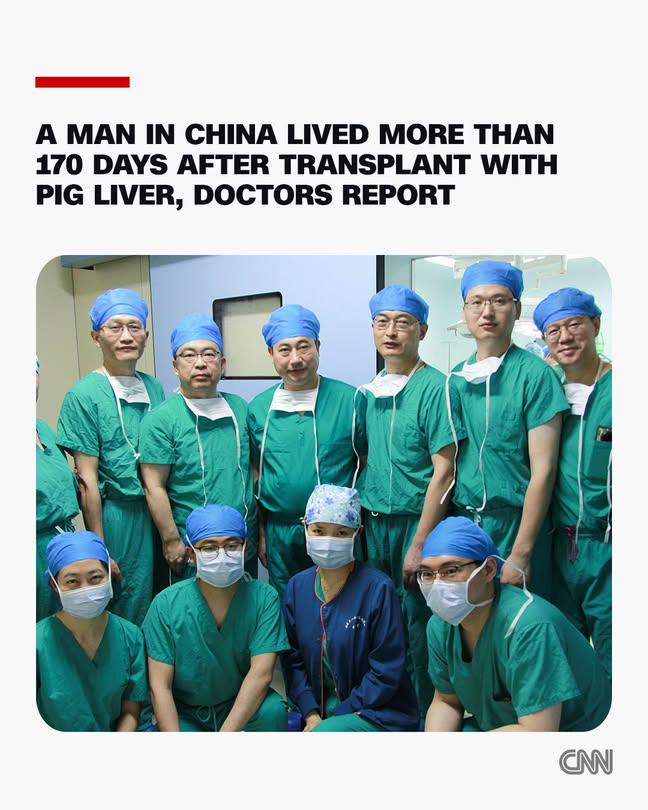CELEBRITY
Chinese Doctors Report Landmark Pig Liver Transplant: Patient Survives 171 Days Post-Procedure

Chinese Doctors Report Landmark Pig Liver Transplant: Patient Survives 171 Days Post-Procedure
In a groundbreaking medical development, doctors at the First Affiliated Hospital of Anhui Medical University in China successfully transplanted a genetically modified pig liver into a 71-year-old man, who survived for 171 days following the procedure. The man lived for 38 days with the pig liver functioning inside his body — marking the first such case published in a peer-reviewed journal.
A Milestone in Xenotransplantation
The achievement represents a significant advance in the field of xenotransplantation — the use of animal organs in human patients — and could signal a new frontier in addressing global organ shortages.
Dr. Beicheng Sun, President of the First Affiliated Hospital and co-author of the study published in the Journal of Hepatology, said the findings challenge long-standing skepticism about the feasibility of pig liver transplants.
> “People often believe the liver is too complex to transplant compared to the heart or kidney,” Dr. Sun said. “This case proves otherwise. If we can integrate sufficient human genes into the pig, the liver can become a viable option for future use.”
Complexity and Promise
Unlike hearts or kidneys, the liver performs multiple vital functions — including filtering blood, detoxifying harmful substances, aiding digestion, and regulating blood sugar. Its complexity and dual blood supply have long made it a difficult candidate for cross-species transplantation.
However, this case demonstrated that with advanced genetic modification, a pig liver can temporarily support human life — potentially serving as a “bridge” for patients awaiting human donor organs or liver regeneration.
The Procedure
The patient, who suffered from hepatitis B-related cirrhosis and a large liver tumor, had limited treatment options after chemotherapy proved ineffective. When no compatible human donor was available, the medical team proposed using a gene-edited pig liver cloned with 10 genetic modifications designed to minimize immune rejection and infection risk.
Following the surgery in May 2024, the transplanted liver immediately began producing bile and performing essential liver functions without early signs of rejection. The patient’s remaining liver tissue also showed signs of recovery.
By day 38, doctors determined that the patient’s native liver could sustain his body independently, and the pig organ was removed. The man continued to live another 133 days before passing away due to gastrointestinal bleeding unrelated to transplant rejection.
A Step Toward Bridging the Gap
Experts say this case offers hope for patients in critical need of transplants. Over 100,000 people in the United States alone remain on waiting lists for organ donations — more than 9,000 of whom require liver transplants.
Dr. Heiner Wedemeyer, a hepatology expert at Hannover Medical School in Germany, called the study “a cause for cautious optimism.”
> “This breakthrough opens entirely new possibilities,” Wedemeyer told CNN. “A pig liver could serve as a temporary support, giving patients precious time for their own liver to recover or for a donor organ to become available.”
Expanding the Frontier of Organ Medicine
Recent years have seen several advances in xenotransplantation, including pig-to-human kidney and heart transplants, and the first external liver perfusion using a gene-edited pig organ conducted by Penn Medicine in 2024.
Dr. Sun emphasized that the success of the Chinese case owes much to the patient and his family’s courage.
> “We must express deep respect and gratitude to the patient and his loved ones,” Sun said. “Their willingness to participate has made an invaluable contribution to the progress of medical science.”
The Road Ahead
While challenges such as immune rejection and clotting complications remain, researchers are optimistic that genetically engineered pig organs could one day bridge the widening gap between organ demand and availability.
As Dr. Wedemeyer noted, “We are witnessing the early stages of a new era in transplantation science — one that could fundamentally reshape how we save lives.”












